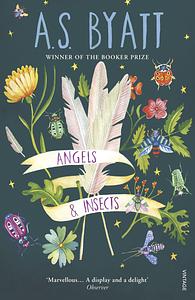Take a photo of a barcode or cover
I find myself returning to some ideas in the first novella in this collection, Morpho Eugenia, after reading it late last year. Byatt has created a post-modern masterpiece using both hybrid and Victorian forms. The ways that this novella unfolds and reveals the truth (or lack thereof) about this upper-class English family seem both methodical and unreal. Parts of it are slow— like the text within a text by Matty Crompton, but definitely worth the time.
This book joins two novellas, like butterfly wings affixed to a thin body. I came for the first - about Victorian Era entomologists. I surprisingly loved the book for the second, about Victorian Era spiritualists.
Both have Byatt's slow pace, theological concern, and literary sensibilities, wrapped around a juicy love plot. Recommended for people who love Charles Darwin or Alfred Tennyson - and especially for those who love both.
Both have Byatt's slow pace, theological concern, and literary sensibilities, wrapped around a juicy love plot. Recommended for people who love Charles Darwin or Alfred Tennyson - and especially for those who love both.
Everyone else seems more impressed by the title story, but I love "The Conjugal Angel" best.
From IMDb:
The movie is a study of an aristocratic family in the Victorian England. William Adamson, a young scientist, is introduced into the aristocratic family Alabaster by reverend Alabaster who is also fascinated by insects. William marries the older daughter of the family and studies the amounts of insects in the garden of the villa. His - for the aristocrats - strange behaviours reveal at the same time their own failures and passions. Written by Volker Boehm
Director: Philip Haas
Stars: Mark Rylance, Kristin Scott Thomas, Patsy Kensit
4* Angels and Insects
4* Possession
3* The Virgin in the Garden
4* The Children's Book
TR Still Life
TR A Whistling Woman
TR The Matisse Stories
TR Babel Tower
TR Ragnarök: The End of the Gods
The movie is a study of an aristocratic family in the Victorian England. William Adamson, a young scientist, is introduced into the aristocratic family Alabaster by reverend Alabaster who is also fascinated by insects. William marries the older daughter of the family and studies the amounts of insects in the garden of the villa. His - for the aristocrats - strange behaviours reveal at the same time their own failures and passions. Written by Volker Boehm
Director: Philip Haas
Stars: Mark Rylance, Kristin Scott Thomas, Patsy Kensit
4* Angels and Insects
4* Possession
3* The Virgin in the Garden
4* The Children's Book
TR Still Life
TR A Whistling Woman
TR The Matisse Stories
TR Babel Tower
TR Ragnarök: The End of the Gods
There are enjoyable moments and tangents here, though some of the latter novella drags.
Two novellas by A.S. Byatt, the author of a particular favorite book of mine, Possession. Both stories share some commonalties with that work: an historical setting made real through the use of documents (poems, stories) that signify the date of their creation by their style. Both stories are set in the past, near the turn of the 19th century. “Morpho Eugenia” (the insects of the title) is a little mystery story about a naturalist who has lost all of his specimens during a sea-wreck and is forced to work as a catalogist for a wealthy amateur, working through the amateur’s bought samples. The naturalist is loosely based, it seems, on Alfred David Wallace, the co-discoverer of the theory of natural selection with Charles Darwin. He finds that his patron’s family is nearly as interesting as nature, especially one young lady cocooned from the world. But cocoons hide things.
The second story is more like Possession in that it plays revisionistic (or maybe impressionistic) with Alfred, Lord Tennyson, and his sister Emily through the medium of a medium (that is, a clairvoyant). The point around which the story revolves is Arthur Hallem, the subject of Tennyson’s “In Memoriam,” a friend of his youth and the betrothed of his sister, who died on a sea voyage when Hallem was twenty-two. Emily, now married, has lingering doubts about her choice of marriage, wondering, if she should have, as her brother’s poem snidely implies, spent her days in perpetual maidenhood. Are we destined to have only one soul mate, the other being with which we form ‘the conjugal angel’?
Byatt’s style is Byzantine. Her scholarship into literary history has informed her pen to leak the century from its nib, and is not for those married to modernity. Yet her subjects are fresh and vibrant, pictured with painful clarity in the harshest of lights. Her characters ache in-between the lines.
The second story is more like Possession in that it plays revisionistic (or maybe impressionistic) with Alfred, Lord Tennyson, and his sister Emily through the medium of a medium (that is, a clairvoyant). The point around which the story revolves is Arthur Hallem, the subject of Tennyson’s “In Memoriam,” a friend of his youth and the betrothed of his sister, who died on a sea voyage when Hallem was twenty-two. Emily, now married, has lingering doubts about her choice of marriage, wondering, if she should have, as her brother’s poem snidely implies, spent her days in perpetual maidenhood. Are we destined to have only one soul mate, the other being with which we form ‘the conjugal angel’?
Byatt’s style is Byzantine. Her scholarship into literary history has informed her pen to leak the century from its nib, and is not for those married to modernity. Yet her subjects are fresh and vibrant, pictured with painful clarity in the harshest of lights. Her characters ache in-between the lines.
I picked up Angels & Insects mainly for its second novella, which is about spiritualism and a seance, and as such interests me greatly. All I knew about the first novella was that it had something to do with insects and the Victorian era, and I'd give it a shot.
Well, that first novella blew me out of the freaking water. 5/5 stars for sure. The twists! The prose! The unadulterated yearning! The talk about insects, which I thought would be somewhat boring, rendered incredibly interesting! That ending! I am in such awe of the way A.S. Byatt wove sentences together. It's a novella I'm going to reread at some point and dissect so I can learn the art of writing from her, of that I am sure.
As for the second novella: 4/5. It was quite slow, and I do admit I knew incredibly little about Tennyson. The story still worked for me, because A.S. Byatt is a wonder with language, but I think I would have enjoyed it more had I known more about the historical backgroud. Still, I adored most of it, especially the parts where Sophy goes into a trance.
Lovely, lovely, lovely! I've discovered another author whose work I want to savour, that's for sure.
Well, that first novella blew me out of the freaking water. 5/5 stars for sure. The twists! The prose! The unadulterated yearning! The talk about insects, which I thought would be somewhat boring, rendered incredibly interesting! That ending! I am in such awe of the way A.S. Byatt wove sentences together. It's a novella I'm going to reread at some point and dissect so I can learn the art of writing from her, of that I am sure.
As for the second novella: 4/5. It was quite slow, and I do admit I knew incredibly little about Tennyson. The story still worked for me, because A.S. Byatt is a wonder with language, but I think I would have enjoyed it more had I known more about the historical backgroud. Still, I adored most of it, especially the parts where Sophy goes into a trance.
Lovely, lovely, lovely! I've discovered another author whose work I want to savour, that's for sure.

